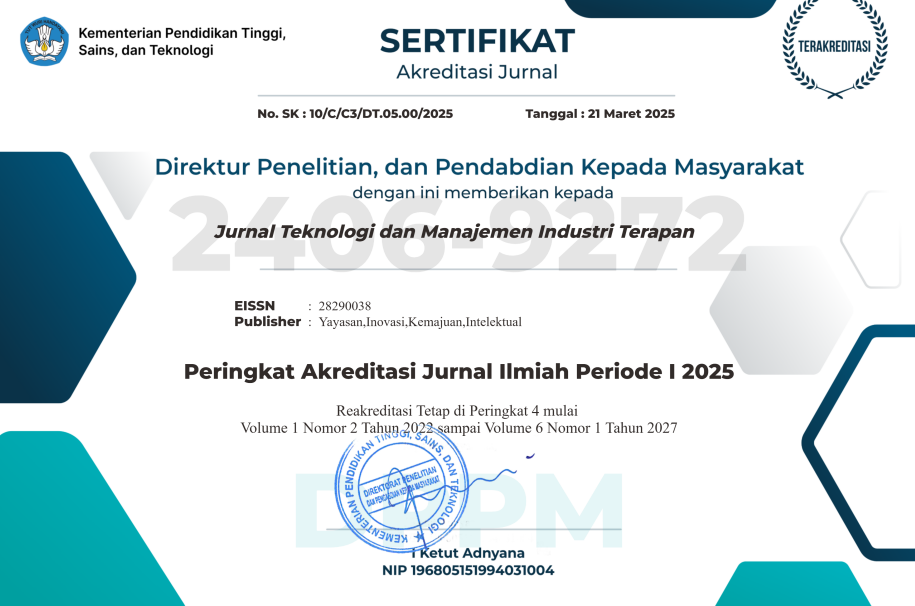Resonant Leadership Style As A Moderating Variable Of The Influence Of Human Resource Information System On Employee Performance
DOI:
https://doi.org/10.55826/jtmit.v4iI.763Keywords:
Resonant Leadership Style, Human Resource Information System, Employee PerformanceAbstract
This study is a quantitative study with an explanatory approach, namely an approach that relies on research to the nineteenth, twentieth, and twenty-first as the main material for building research foundations, building hypotheses, and proving hypotheses in this study. The data used in this study is quantitative data that researchers obtain directly or are also commonly referred to as primary data obtained from Zuri Group hotel employees spread throughout Indonesia as many as two hundred and fifty employees. The data obtained by the researcher were distributed through an online questionnaire containing ten questions with five choices including the choice of strongly agree, the choice of agree, the choice of so-so, the choice of disagree, and the choice of strongly disagree. The data obtained by the researcher were analyzed using the smart PLS 4.0 analysis tool. The result in this article show that the Human Resource Information System variable can have a positive relationship direction and significant influence on Employee Performance and the Resonant Leadership Style variable can strengthen the influence of the Human Resource Information System variable on Employee Performance. The results of the second row of the third table above show that the Human Resource Information System variable can have a positive relationship direction and significant influence on Employee Performance can be accepted because the P-Values are positive and below the significance level of 0.05, namely 0.004. Based on these results, it can be concluded that the higher the Human Resource Information System, the higher the Employee Performance. In the next row, the Resonant Leadership Style variable can also moderate the influence of the Human Resource Information System variable on Employee Performance because the P-Values are positive and below the significance level of 0.05, namely 0.000, more significant than direct testing of 0.004. Thus it can be concluded that the first and second hypotheses in this article can be accepted.
References
Robbins, Perilaku Organisasi. Jakarta: Gramedia Pustaka Utama, 2016.
S. . Robbins, Perilaku Organisasi, Konsep, Kontroversi Dan Aplikasi, Edisi Keenam. Jakarta: PT.Bhuana Ilmu Populer, 1996.
M. Robbins, Stephen P. And Coulter, Manajemen. Edisi Kesepuluh. Dialihbahasakan Oleh Bob Sabran, M.M. Dan Devri Barnadi Putra, S.E. Jakarta: Penerbit Erlangga, 2010.
L. Wakhid, “Manajemen Sumber Daya Manusia (MSDM) Dalam Meningkatkan Pelayanan Di Lembaga Pendidikan MA Tahfidzqur’an Al Islami Pesanggrahan Tahun Pembelajaran 2020/2021,” J. Manaj. Pendidik. Islam Darussalam, Vol. 3, No. 2, Pp. 176–192, 2021.
H. Khairul, “Kebutuhan Akan SDM Doktrin Ekonomi (Konsep MSDM, Identifikasi Nilai SDM, Penawaran Dan Permintaan Tenaga Kerja Serta Karakteristik Tenaga Kerja Terdidik, Upaya Pengembangan SDM),” J. Keagamaan Dan Penddikan, Vol. 17, No. 1, P. 76, 2021.
P. S. Depitra And H. Soegoto, “Pengaruh Gaya Kepemimpinan Terhadap Kinerja Karyawan,” Maj. Ilm. UNIKOM, Vol. 16, No. 2, Pp. 185–188, 2018, Doi: 10.34010/Miu.V16i2.1361.
D. & S. Mulyani, “Pengaruh Gaya Kepemimpinan Terhadap Turnover Intentions Dan Perilaku Kerja Kontraproduktif Karyawan Pada Perusahaan Ono Swalayan Sidareja,” Pembagian Harta Waris Dalam Adat Tionghoa Di Kec. Ilir Timur I Kota Palembang, Vol. 1, No. 14 June 2007, Pp. 1–13, 2018, [Online]. Available: Https://Core.Ac.Uk/Download/Pdf/11715904.Pdf
Faizal Roni, “Gaya Kepemimpinan Transformasional Dan Transaksional Serta Dampaknya Terhadap Kepuasan Kerja Karyawan,” Widya Cipta, Vol. 3, No. 1, Pp. 171–178, 2019, [Online]. Available: Http://Ejournal.Bsi.Ac.Id/Ejurnal/Index.Php/Widyacipta
H. Suganda, Sutrisno, And N. Setyorini, “Pengaruh Gaya Kepemimpinan, Kompensasi Dan Lingkungan Kerja Terhadap Turnover Intention Dengan Stres Kerja Sebagai Variabel Intervening,” Transekonomika Akuntansi, Bisnis Dan Keuang., Vol. 3, No. 4, Pp. 799–810, 2023, Doi: 10.55047/Transekonomika.V3i4.509.
M. E, “Meningkatkan Work Engagement Melalui Gaya Kepemimpinan Transforasional Dan Budaya Organisasi,” J. Psikol., Vol. 3, No. 1, Pp. 3–8, 2012.
N. Erman And A. Fahroby, “Pengaruh Gaya Kepemimpinan Terhadap Kinerja Karyawan Pada Pt. Rusindo Expertiza Inspekciya Pekanbaru,” INSTITUT AGAMA ISLAM NEGERI SURAKARTA, 2022. [Online]. Available: Https://Jurnal.Institute-Ehmri.Ac.Id/Index.Php/Mapan/Article/View/108%0Ahttps://Jurnal.Institute-Ehmri.Ac.Id/Index.Php/Mapan/Article/Download/108/85
E. Susilowati, “PENGARUH PERILAKU KEPEMIMPINAN, KEMAMPUAN KOGNITIF, DAN KEPUASAN KERJA, TERHADAP KINERJA KARYAWAN,” Strateg. Kepala Sekol. Dalam Meningkat. Mutu Lulusan Di SMA Negeri 1 Batusangkar, Vol. 9, No. 2, Pp. 32–44, 2021.
Fiorincia And N. Widayati, “Pengaruh Gaya Kepemimpinan , Beban Kerja , Dan Job Insecurity Terhadap Turnover Intention Karyawan,” J. Ilmu Manaj., Vol. 1, No. 1, Pp. 1–7, 2020.
A. Krisnadi And J. Tarigan, “Pengaruh Gaya Kepemimpinan Terhadap Kinerja Keuangan Melalui Perilaku Manajer Atas Isu Manajemen Lingkunga Sebagai Variabel Intervening,” Bus. Account. Rev., Vol. 4, No. 1, Pp. 169–180, 2016.
F. Tjiptono, Service, Quality And Satifactions. Yogyakarta: Andi Offset, 2016.
Y.- Maini And A. Tanno, “Pengaruh Beban Kerja, Teamwork Dan Kepemimpinan Terhadap Kepuasan Kerja Dan Kinerja Pegawai (Studi Kasus Pada Bappeda Kota Payakumbuh),” J. BONANZA Manaj. Dan Bisnis, Vol. 2, No. 1, Pp. 31–50, 2021, Doi: 10.47896/Mb.V2i1.360.
Dien Sandra Rosuliana, Afira Arum Salsabila, Rita Amelia, And Riyan Sisiawan Putra, “Pengaruh Gaya Kepemimpinan Dan Kepuasan Kerja Terhadap Kinerja Karyawan Pt. Nutrifood Indonesia Di Surabaya,” EKOMA J. Ekon. Manajemen, Akunt., Vol. 2, No. 1, Pp. 190–194, 2022, Doi: 10.56799/Ekoma.V2i1.1159.
Subroto, “Menerapkan Gaya Kepemimpin Beresonansi (Resonance Leadership) Dalam Organisasi By Subroto,” Birokratmenulis.Org, 2020. Https://Birokratmenulis.Org/Menerapkan-Gaya-Kepemimpin-Beresonansi-Resonance-Leadership-Dalam-Organisasi/
REGITA PUTRI TJUANA, “PENGARUH HUMAN RESOURCE INFORMATION SYSTEM (HRIS) DAN KOMPETENSI DIGITAL TERHADAP KINERJA KARYAWAN DENGAN KEPUASAN KERJA SEBAGAI VARIABEL MEDIASI,” UNIVERSITAS KRISTEN SATYA WACANA SALATIGA, 2024.
A. Masruro, “Analisis Peran HRIS Terhadap Kinerja Karyawan Pt. Kabana Textile Industries,” J. Ekon. Dan Bisnis, Vol. 9, No. 2, Pp. 227–239, 2022, Doi: 10.51792/Jeb.Vol9.Jeb1.155.
B. A. Wibowo And D. Indiyati, “Peran Human Resource Information System (HRIS) Terhadap Kinerja Karyawan Pada Pt. Kereta Api Indonesia (Persero) Daop Vi Yogyakarta,” E-Proceeding Manag., Vol. 10, No. 2, Pp. 1026–1031, 2023.
D. Winda Meidina And Dan S. Netty Laura, “The Effect Of Employees’ Mental Health On Performance Mediated By Welfare In The Workplace (Empirical Study On Information Technology Division Employees During Work From Home,” Bus. Manag. J., Vol. 18, No. 1, Pp. 85–105, 2022, Doi: 10.30813/Bmj.
N. Huda, “Pengaruh Motivasi Kerja Terhadap Kinerja Karyawan Pada PT. Bank Sul-Sel Makassar,” UNIVERSITAS ISLAM NEGERI (UIN) ALAUDDIN, 2011. [Online]. Available: Http://Repositori.Uin-Alauddin.Ac.Id/11479/
Dodi, “Pengaruh Iklim Organisasi, Etos Kerja Dan Disiplin Terhadap Kinerja Karyawan Serta Dampaknya Pada Kinerja PT. Arun NGL Lhokseumawe Aceh,” J. Manaj., Vol. 02, No. 01, Pp. 98–107, 2013.
R. Rukin, Metodologi Penelitian Kualitatif. 2019.
Danang Saputro, “PENGARUH KEPUASAN KERJA TERHADAP KINERJA KARYAWAN PT. DUREN MANDIRI FORTUNA (PLYWOOD),” Braz Dent J., Vol. 33, No. 1, Pp. 1–12, 2022.
M. Anggraeni And S. Sanaji, “Pengaruh Penggunaan Media Sosial Terhadap Kinerja Pemasaran Selama Pandemi Covid-19 Dengan Mediasi Kemampuan Inovasi Dan Kemampuan Branding (Studi Pada Pelaku UMKM Yang Menggunakan Media Sosial).,” J. Ilmu Manaj., Vol. 9, No. 2, P. 752, 2021, Doi: 10.26740/Jim.V9n2.P752-767.
A. S. Supriyanto, Riset Manajemen Sdm. Malang: Inteligensia Media, 2019.
M. Sarstedt, C. M. Ringle, D. Smith, R. Reams, And J. F. Hair Jr, “Partial Least Squares Structural Equation Modeling (PLS-SEM): A Useful Tool For Family Business Researchers,” J. Fam. Bus. Strateg., Vol. 5, No. 1, Pp. 105–115, Mar. 2014.
I. Ghozali, Aplikasi Analisis Multivariete Dengan Program (IBM. SPSS). Diponergoro: Univrsitas Dipenogoro, 2016.
Downloads
Published
Issue
Section
License
Copyright (c) 2025 Muhammad Risal Tawil, Teguh Setiawan Wibowo, Rasty Yulia, Dikky Mooy, Muhammad Syafri

This work is licensed under a Creative Commons Attribution-NonCommercial-ShareAlike 4.0 International License.


















